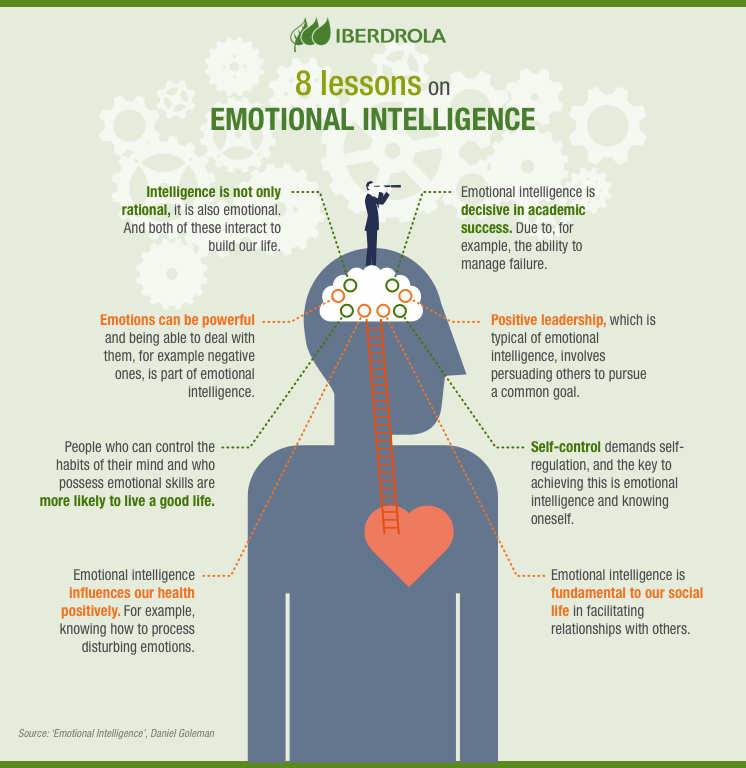What is emotional inteligence?
Emotional intelligence, the most in-demand 'soft skill' in the workplace
High performance Labour productivity Professional skills
Joy, nerves, surprise, anger, calm, disappointment... managing the roller-coaster of emotions that we experience on a daily basis is not easy. However, emotional intelligence is becoming increasingly important as a way to achieve happiness in all aspects of our lives, including the workplace. Do you want to learn to be happy?

Emotions influence our daily lives. The book Emotional Intelligence published in 1995 by the American psychologist Daniel Goleman launched this discipline worldwide. Even the United Nations Educational, Scientific and Cultural Organization (UNESCO) launched an initiative in 2002 in which it sent a statement including ten basic principles to the education ministers of 140 countries to launch social and emotional learning programs.
What is emotional intelligence and what is it for?
According to Goleman, emotional intelligence is the ability to recognise our own feelings and those of others, to guide us and to better manage our relationships. What is it for? It's mainly useful for understanding more of our own emotional information and that of others because emotion is the physical expression of our mind and it never lies. Emotions inform us how our mind is processing what we experience and this is very useful both in our personal and professional lives because it allows us, for example, to be aware of what we say and the way we say it.
Can the proper management of emotions lead to happiness? Emotional intelligence helps us to overcome those negative attitudes, beliefs and habits that condition us and limit us, and thus prevent us from realising our full potential. Timothy Gallwey, author of numerous books on developing personal and professional excellence, stated that in this regard, the way we perform in life can be summed up by a simple equation: p (performance) = P (potential) - I (interference). In other words, the less negative emotional interference we have, the more potential we will achieve.
Emotional intelligence in the company
Emotional intelligence in the workplace is one of the most sought-after skills by companies in today's business world, especially as most repetitive and routine tasks are now automated. In fact, according to a recent CapGemini study called Emotional Intelligence: The Essential Skillset For The Age Of AI, 76% of managers believe that employees should develop these skills, since they will have to adapt to roles that deal more with people and clients.
According to the report, the same percentage believe that employees will have to take on more tasks requiring emotional skills that cannot be automated, such as empathy, persuasion and teamwork. Generally speaking, 83% of companies say that having staff with good skills in emotional intelligence will be essential to achieving success in the coming years.
According to Goleman, high IQ is only capable of predicting 20% of the factors for success, while the remaining 80% depend on other variables such as social class, luck and, to a large extent, emotional intelligence. Something similar happens in companies, according to the study: 60% of organisations with an emotionally intelligent workforce achieve 20% better results than others in various business indicators such as productivity, employee satisfaction, market share and customer service.

How to develop emotional intelligence
Can you learn to be emotionally intelligent? The answer is yes, although it is neither simple nor achieved overnight. These are five key elements for emotional intelligence to work.
Self-awareness
Possessing a deep understanding of our emotions and also our impulses, helping us to react to them in a positive way.
Self-regulation
Controlling the emotions that generate negativity - anxiety, sadness, anger, etc.-. It's not about repressing those feelings because they have their usefulness, but it's about finding the balance so as not to become their prisoner.
Self-motivation
Emotionally intelligent people are characterised by having the willpower and inner strength required to achieve their goals. Optimism is an essential requirement for achieving goals.
Empathy
The ability to put yourself in other people's shoes is key, understanding their feelings and motivations without assuming they are the same as yours.
Social skills
This involves relating to the people around us seeking not only to benefit ourselves, but also to benefit others.




